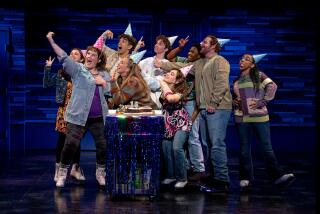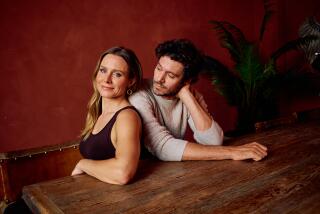‘Love Letters’ Proves Poignancy of Simplicity : Theater: Charles Kimbrough and Beth Howland get back to basics as the corresponding lovers in the A.R. Gurney play.
SAN DIEGO — The success of “Love Letters” “surprised people who should have known better,” Charles Kimbrough said.
Kimbrough, who co-stars with Beth Howland in the Old Globe production of “Love Letters” this week, was the first actor to read it for playwright A.R. Gurney back in 1987. He read it with actress Holland Taylor.
“I don’t think Pete (Gurney) thought of it as a play,” Kimbrough said on the phone from Howland’s Los Angeles home, where he was having dinner. “I don’t think he ever thought of it as having commercial possibilities--as something that would make money. It seemed very slight, very slender. Which shows how quickly we lose our faith in a simple story, simply told. I think there’s a real hunger in this age of glitz for this once-upon-a-time kind of feeling, where someone sits and reads.”
Kimbrough stressed that that first reading was just a reading, not a performance. But it was from that tentative beginning, at Playwrights Horizons in Manhattan, that the show was booked first on Sundays at Playwrights Horizons and later at the Promenade Theatre, where it went on to become an Off-Broadway sensation.
In all that time, the format never changed. An actor and an actress would sit at a table and read the letters that had been written over the course of a lifetime between the fictional Melissa Gardner and Andrew Makepeace Ladd III.
Because it is in the form of letters, the script can be read rather than memorized. This proved to have unforeseen benefits. Actors could come in on a day’s rehearsal and play the parts for a week. This became increasingly attractive to celebrity actors who longed to sink their teeth into a quality theater script, but didn’t have the time to commit to a full run.
Kimbrough was not one of those celebrity names at the time, but by 1988 he was to become so--as the stuffy anchor, Jim Dial, on the CBS comedy hit, “Murphy Brown,” airing Mondays at 9 p.m. on Channel 8. Though he made his name on Broadway, starring in numerous Broadway and Off-Broadway shows over the course of 20 years, his debut Old Globe performance will mark only his second return to theater since the start of “Murphy Brown.”
The first return was also in “Love Letters”--opposite Kate Jackson--from July 31 to Aug. 5 at Beverly Hills’ Canon Theatre.
Because of the television series, a week is a lot to squeeze out of Kimbrough’s schedule. This week was supposed to have been his vacation.
At the Old Globe, Kimbrough co-stars with Howland, whom he met 20 years ago when each got their first Broadway breaks on the set of Stephen Sondheim’s “Company.”
Kimbrough picked up a Tony nomination for his work as Harry, the conflicted married man who sings “Sorry-Grateful.” Howland had the distinction of having Sondheim write a song just for her range “of three notes,” as she calls it.
Actually, the original song she was supposed to sing was “The Wedding Was Off.”
“It had a much harsher edge,” Howland recalled. “He (Sondheim) didn’t feel that song fit me.”
Sondheim substituted “Getting Married Today,” a sweetly ambivalent song about marriage phobia. He may have written it with her range of three notes in mind, Howland says, but those three notes “are pure gold.”
Although Kimbrough stayed in New York after “Company,” Howland and her daughter set out for Los Angeles. After an initial guest spot on “The Mary Tyler Moore Show,” she languished for parts--and the money to return home--until she landed the part of the flaky waitress, Vera, on the pilot of “Alice.”
With the money from the pilot, she and her daughter began to pack their bags. Then the show was picked up and she stayed--for nine years.
When “Alice” ended, she returned to theater and tried producing.
She won an Academy Award for producing a documentary, “You Don’t Have To Die,” in 1988.
But Howland said she wants to return to acting, and it doesn’t matter where.
“I would really just like to work,” she said.
This will mark her second performance at the Old Globe Theatre but her debut performance in “Love Letters.”
“I love the characters, both of them,” she said. “I love her sense of adventure, her zest for life, the way she never gives up and pushes on and tries to do her thing.”
Does she feel that being type-cast by her role as Vera has hurt her in getting other parts?
“Type-casting is a problem on one hand. On the other hand, no one would know who I am if I hadn’t done it.”
Type-casting doesn’t seem to be a problem that worries Kimbrough, either. He said he could see doing “Murphy Brown” for “about 964 years. I’m very happy in it. And I love getting paid and going to work every day.”
But, despite his new-found success as a TV star, Kimbrough enjoys being back on the stage--particularly in this play.
The actor, in the process of getting divorced, is increasingly sensitive to the fragility of relationships, which is one of the themes of the play. But he said that this affects his performance less than learning to trust the material--that first lesson that he and Gurney and Gurney’s producers just began to learn back in 1987.
“As an actor, usually you are paid to sing for your supper. Sing, dance, all those things. And here you are just reading these letters. I found one of the hardest things about the show is to trust how simple it all is. Then, during the week, you make all these discoveries. You find that just saying the letters out loud and being the character in a simple way is enough. The piece is so swell that the audience leans forward and you can put away the spangled tap shoes.”
More to Read
The biggest entertainment stories
Get our big stories about Hollywood, film, television, music, arts, culture and more right in your inbox as soon as they publish.
You may occasionally receive promotional content from the Los Angeles Times.










